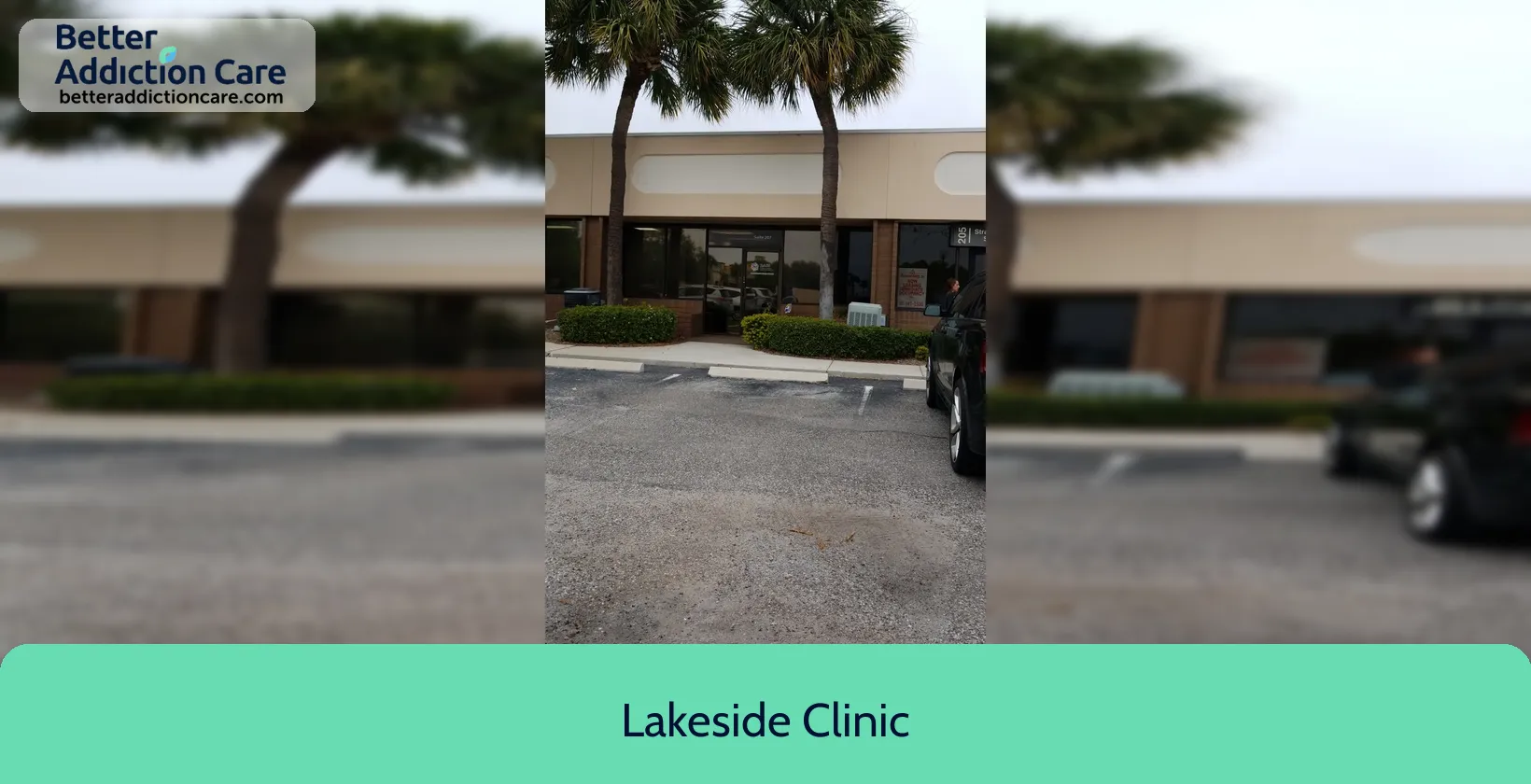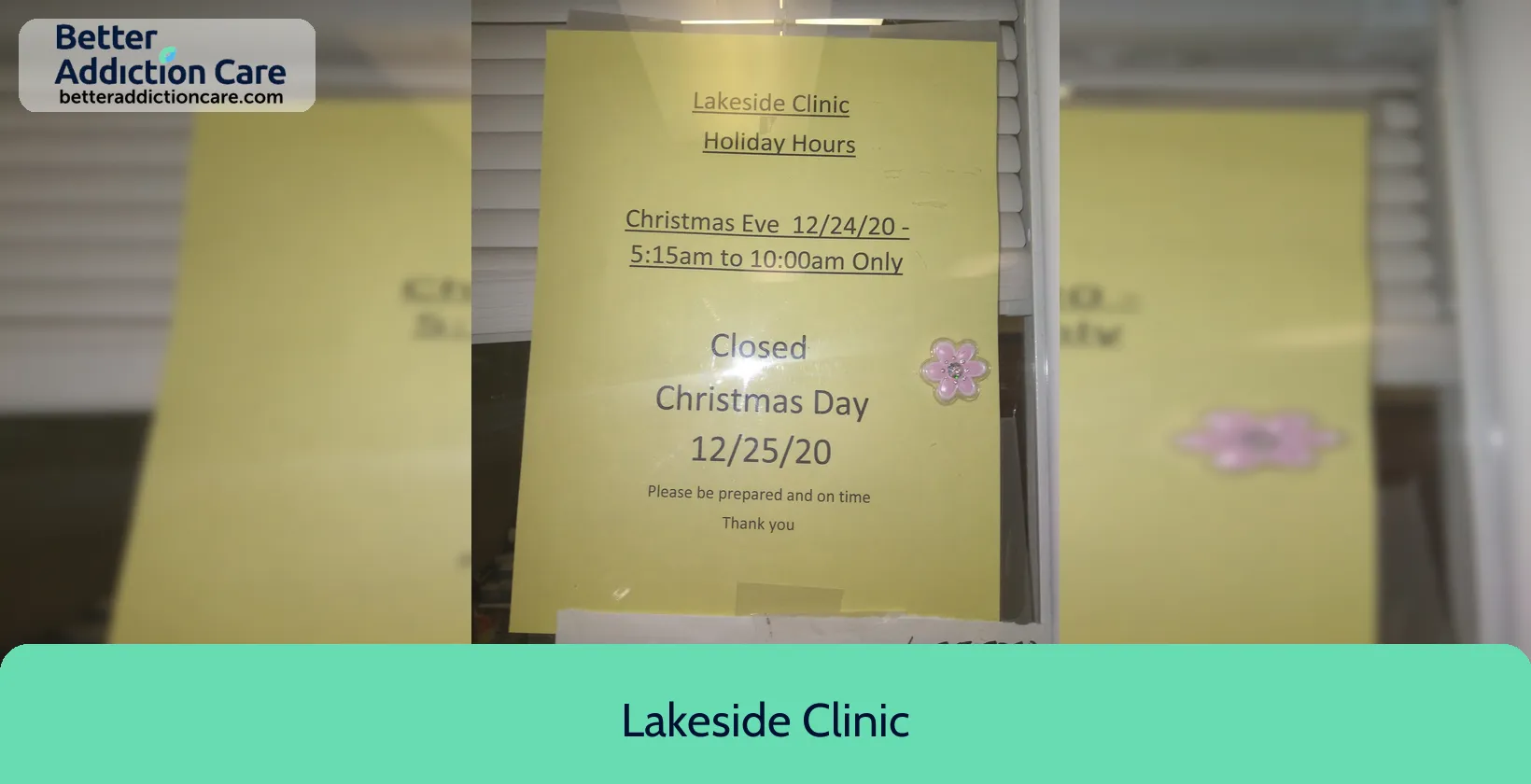Lakeside Clinic
Overview
Lakeside Clinic is an accredited substance abuse treatment center that provides outpatient detoxification, for men and women between 18 and 65+ years of age. As part of their special programs, Lakeside Clinic treats criminal justice (other than dui/dwi)/forensic clients and pregnant/postpartum women. To help patients achieve sobriety, Lakeside Clinic provides treats opioids detoxification and medication routinely used during detoxification.. Afterward, patients receive group counseling, life skills, and cognitive behavioral therapy during treatment. Lakeside Clinic is located in Clearwater, Florida, providing treatment for people in Pinellas County, accepting cash or self-payment.
Lakeside Clinic at a Glance
Payment Options
- Cash or self-payment
Assessments
- Comprehensive substance use assessment
- Screening for tobacco use
- Outreach to persons in the community
- Screening for mental disorders
- Screening for substance use
Age Groups
- Adults
- Young adults
- Seniors
Ancillary Services
- Suicide prevention services
- Early intervention for HIV
- Social skills development
- Opioid use disorder clients only
- Case management service
Highlights About Lakeside Clinic
6.96/10
With an overall rating of 6.96/10, this facility has following balanced range of services. Alcohol Rehabilitation: 8.21/10, Drug Rehab and Detox: 6.31/10, Insurance and Payments: 6.00/10, Treatment Options: 7.33/10.-
Alcohol Rehabilitation 8.21
-
Treatment Options 7.33
-
Drug Rehab and Detox 6.31
-
Insurance and Payments 6.00
Accreditations
State department of health:

Government agencies issue State Licenses, granting permission to rehabilitation organizations to conduct their business operations lawfully within specific geographic regions. Generally, the particular rehabilitation programs offered by a facility and its physical location dictate the necessary licenses needed for legal operation.
Commission on Accreditation of Rehabilitation Facilities (CARF):

CARF accreditation is a prestigious recognition for organizations in rehabilitation and human services. It signifies that an organization meets rigorous quality standards and is committed to providing top-notch care. Achieving CARF accreditation involves a thorough evaluation process, including on-site surveys, to ensure excellence in programs and services. This accreditation boosts an organization's credibility, assures clients and funders of quality, and promotes ongoing improvement in the field of rehabilitation and human services.
Treatment At Lakeside Clinic
Treatment Conditions
- Opioid Addiction
- Substance use treatment
Care Levels
- Outpatient
- Outpatient detoxification
- Outpatient methadone/buprenorphine or naltrexone treatment
- Aftercare
Treatment Modalities
- Group counseling
- Life Skills
- Cognitive behavioral therapy
- Telemedicine/telehealth therapy
- Substance use disorder counseling
Ancillary Services
Languages
- Spanish
Additional Services
- Pharmacotherapies administered during treatment
- Housing services
- Breathalyzer or blood alcohol testing
Special Programs
- Criminal justice (other than DUI/DWI)/Forensic clients
- Pregnant/postpartum women
Contact Information
Read our Most Recent Article About Drug Addiction
DISCLAIMER: The facility name, logo and brand are the property and registered trademarks of Lakeside Clinic, and are being used for identification and informational purposes only. Use of these names, logos and brands shall not imply endorsement. BetterAddictionCare.com is not affiliated with or sponsored by Lakeside Clinic.










